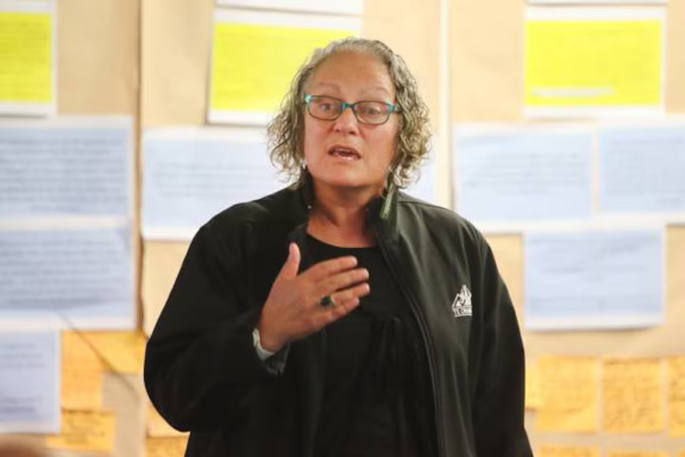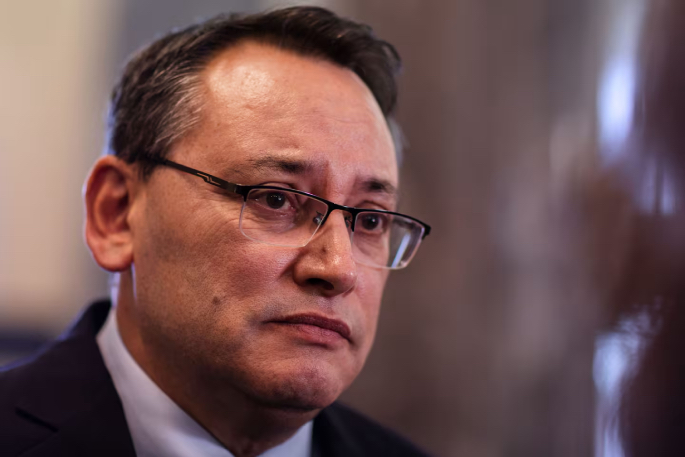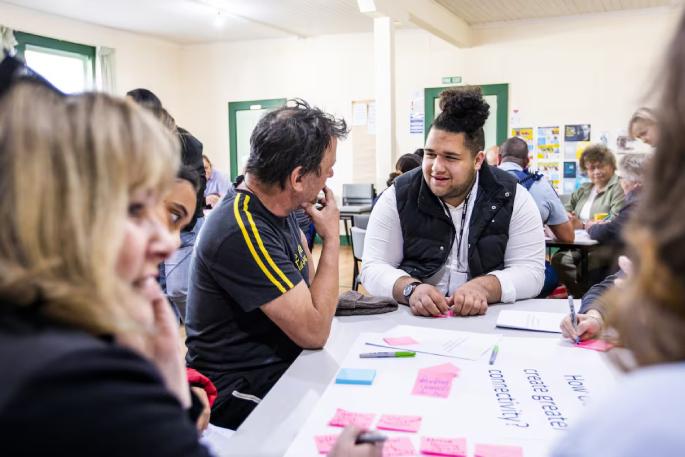Māori health providers are “holding tight to each other”'after the Te Aka Whai Ora Māori Health Authority came to an abrupt end after two years of fighting inequalities within the system.
Te Aka Whai Ora Māori Health Authority was created in July 2022 to ensure that the health system met the needs of Māori.
In February, the new coalition government passed the Pae Ora (Disestablishment of the Māori Health Authority) Amendment Bill, ushering in a new round of reforms. Te Aka Whai Ora was disestablished on June 30.
Local Democracy Reporting speaks to mātaiwhetū/chief executive of Whanganui hauora Māori provider Te Oranganui, Wheturangi Walsh-Tapiata, about the loss of Te Aka Whai Ora and the future of Māori health under the latest reform.
Māori health providers are in “a state of abeyance” after Te Aka Whai Ora, the Māori Health Authority, was scrapped.
Wheturangi Walsh-Tapiata, mātaiwhetū of Te Oranganui in Whanganui, says hauora Māori providers are waiting to see if the changes will deliver the benefits that were being advanced under Ta Aka Whai Ora.
“We’re all holding tight to each other as a group of providers, attempting to support each other, read the scene and provide excellent practice so that, where possible, these changes do not impact on our whānau and we are still able to walk alongside them to achieve their whānau ora goals.”
There were immediate benefits for Māori health providers with the advent of Te Aka Whai Ora, she says.
“Prior to that, the system felt like the hospitals were in charge.
“With Te Aka Whai Ora, we were a community in partnership with other parts of the health system. It meant that we had voice.
“For the first time in my career in hauora, I felt there was a strong focus on Māori, pushing against the inequities in the system, and trying to correct them.”
That ranged from data and commissioning, to public health and what was happening in hospitals, to community outreach and how providers were aligned.
Wheturangi says hauora providers are now in limbo.
“We are waiting to see if there will be ongoing advances for hauora Māori, particularly in an environment where we’re feeling the impact of the cost of living on whānau, and on our ability to survive and create our own solutions.”
Wheturangi says there are multiple strengths and benefits in having a specific organisation that represented the needs of Māori.
The first win for providers came with a dedicated relationship manager.
 Te Oranganui mātaiwhetū Wheturangi Walsh-Tapiata says Māori must be on their toes as the government develops the latest health reforms. Photo / Bevan Conley.
Te Oranganui mātaiwhetū Wheturangi Walsh-Tapiata says Māori must be on their toes as the government develops the latest health reforms. Photo / Bevan Conley.
“Before that, we were getting to the point where we had only an email to connect us to the system. In addition, that manager’s focus was on supporting hauora Māori providers and ensuring we had positive whānau hauora outcomes.”
The second critical advance was an online forum.
“All of us as hauroa Māori providers could now meet regularly to be updated with all the changes occurring, to understand different parts of the system, to hear from the chief executives of Te Aka Whai Ora and Te Whatu Ora on a regular basis and to share what we know.”
The coalition government focus is on “need for all” rather than the needs of Māori or disenfranchised communities, Wheturangi says.
“We will work our darnedest to ensure that ‘need for all’ is encompassing of Māori.
“We need to remain strong, have clear vision on the kaupapa, and keep collectively looking for solutions alongside of our whānau.”
Asked if Māori would hold the coalition government to account if disparities in Māori health are not reduced, Wheturangi says the changes will be challenged if they do not deliver for Māori.
’We have to be on our toes’
“Governments come and governments go, and it is always important for us to be able to adapt to the changes and the key strategies of the government of the day, finding ways to benefit our whānau.
“It is up to us to continue to provide the range of delivery to our whānau that we have had.
“But we will also have to be on our toes.
“We all have to keep our eyes and ears open to the conversations that are coming out from the government.”
Wheturangi says her biggest fear is that the country returns to an old system that does not work for Māori.
“We have to look at opportunities that will benefit our population, and we relish the chance to show examples of excellence that might help cement government thinking or promote alternative ways of doing things.”
On practical changes, Wheturangi says providers like Te Oranganui are now working to 12-month integrated contracts rather than the multi-year contracts they previously held.
“Having met all the deliverables of those contracts, and having shown that we are creating change for our whānau in our communities – which are often isolated, rural, and very Māori – the optimist in me anticipates a return to multi-year contracts within a year.”
’No question that NZ needs to improve Māori health’
Health Minister Shane Reti says improving health “for Māori and everyone else” remains a priority for the government.
“There is absolutely no question that New Zealand needs to improve Māori health outcomes,” he told Local Democracy Reporting.
“Roles and functions from the authority have now been transferred to Health New Zealand and the Ministry, and I have made it very clear that that process needs to work well, to improve outcomes and health needs.”
 Health minister Shane Reti says solutions that will work for Māori will "substantively come from Māori". Photo: RNZ / Angus Dreaver.
Health minister Shane Reti says solutions that will work for Māori will "substantively come from Māori". Photo: RNZ / Angus Dreaver.
Many former Te Aka Whai Ora staff are understood to have returned to the community health sector.
In February, Reti said merging the functions of the Māori Health Authority and transferring staff into the public health system would retain the expertise needed to improve health outcomes “for all New Zealanders including Māori”.
The government believed decisions should be made closer to the community, to the home and the hapū.
“Local circumstances require local solutions rather than national bureaucracies.
“That means that solutions that will work for Māori will substantively come from Māori, noting that two-thirds of Māori are seen by mainstream providers.
“Māori involvement in the design and delivery of services for Māori is likely to mean more effective services, reaching more people who need them.”
Reti says the government’s Budget 2024 committed to a “record investment” in health, including cost pressure funding for hauora Māori services to maintain current service levels.
Iwi Māori partnership boards would have a key role in the planning and delivery of healthcare in their communities.
“Local input into health services, especially primary and community services, is good for everyone and a priority for this Government.”
Te Oranganui mātaiwhetū Wheturangi Walsh-Tapiata says Iwi Māori Partnership Boards and the Hauora Advisory Group are positioned as critical changemakers in the country’s health system.
Both groups would have direct contact with the Health Minister to inform the strategic direction of the new health system and ensure that Māori voice is considered within the changes.
Wheturangi says Te Aka Whai Ora staff who had merged into Health New Zealand and the Ministry of Health would advocate for Māori.
’A spark within’
“They’ll be a spark within the new system. They will ensure that representation for Māori continues and I hope they’ll have a strong voice so that ka whawhai tonu mātou – we can continue to address the challenges and needs on behalf of our people.”
In a farewell video last week, Te Aka Whai Ora chief executive Riana Manuel said staff would continue the work to advance Māori health outcomes from their “new home”.
“We still have mahi to do within our new waka. We will become known as Hauora Māori Services.
“We will continue to climb in pursuit of an equitable health system where Māori are supported to grow and flourish.”
LDR is local body journalism co-funded by RNZ and NZ On Air.




1 comment
What Inequalities?
Posted on 09-07-2024 20:25 | By Yadick
What inequalities are in the system. We all bleed red, we all breath oxygen, we all have a beating heart. That's life. The only 'perceived' inequality is from beliefs, myths and legends. We should not all have to pay the price for someone else's beliefs. If you want different medical and emergency care then you fund it yourself. Funding should not be on racial or religious beliefs. We don't separately fund Chinese medicines on belief, we don't separately fund religious beliefs. It should be one funding for all. The savings would be absolutely phenomenal and the care astoundingly affordable for EVERYONE.
Leave a Comment
You must be logged in to make a comment.